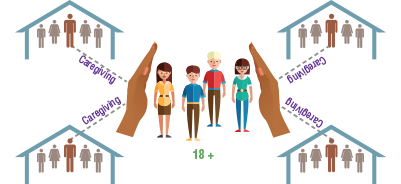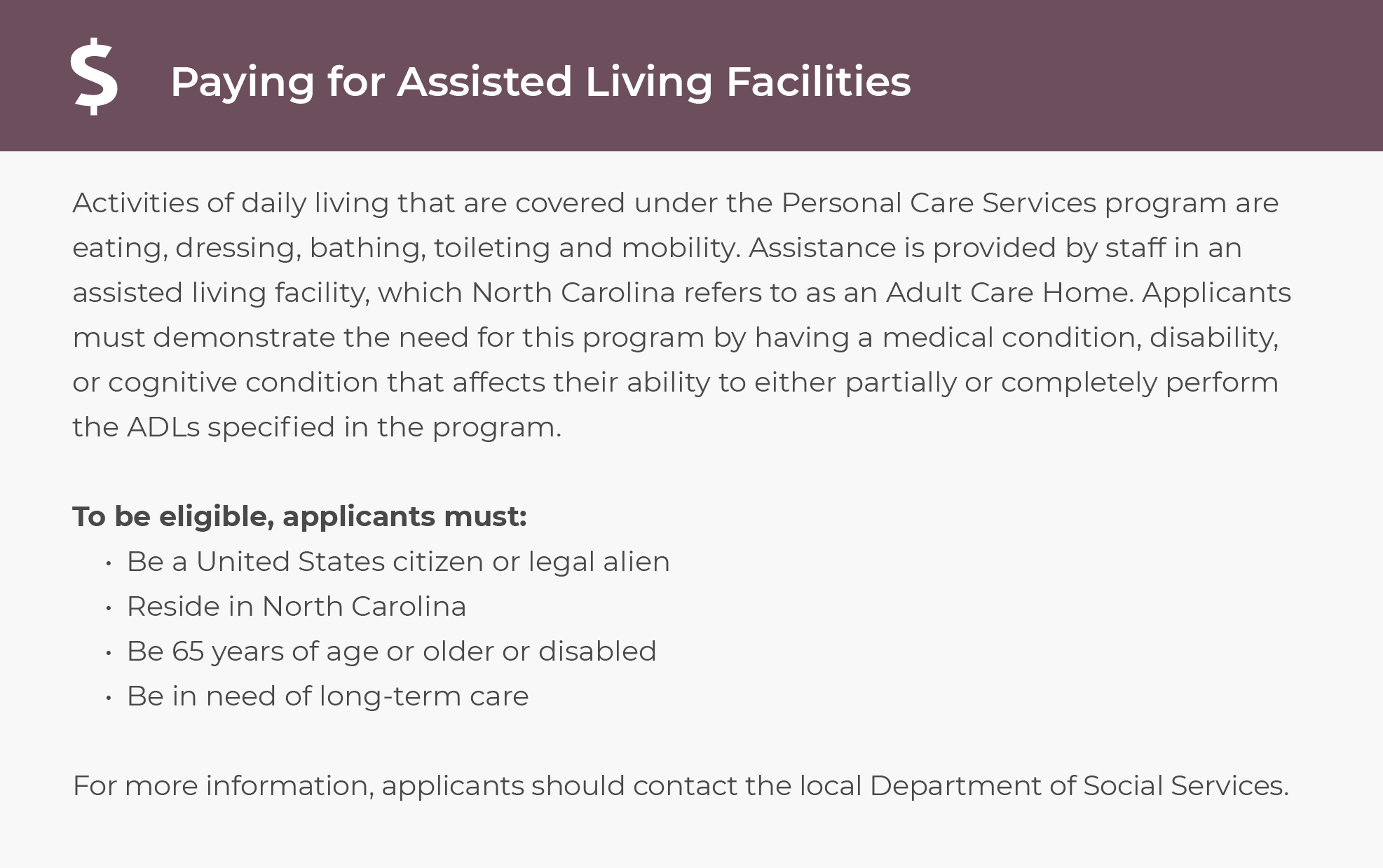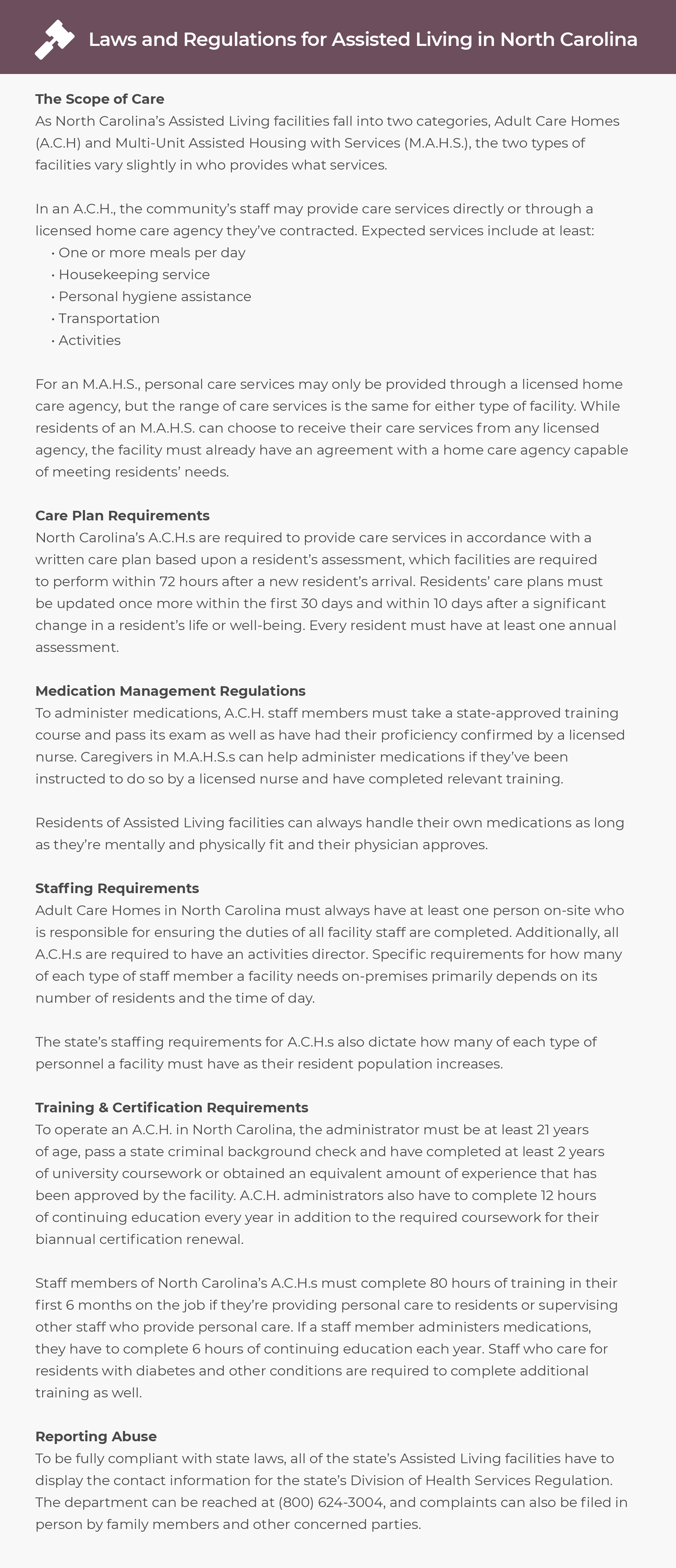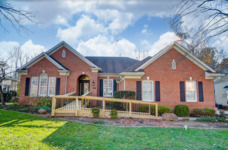Charlotte is a sprawling city that’s home to nearly 900,000 people. While it’s commonly known as a university town, it has a large senior community that accounts for about one in ten of the population. This vibrant city is a business and financial hub and home to the NASCAR Hall of Fame, and with two shopping malls, the SouthPark and Northlake Mall, visitors have plenty of options for shopping and dining. The city has a rich history that visitors can learn about at living history museums, such as the Hezekiah Alexander House, the Historic Latta Plantation and the President James K. Polk Historic Site. With a comfortable climate that features mild winters and warm summers, Charlotte is well-suited for seniors who enjoy outdoor living.
Seniors who need more hours of daily care than what is available or affordable via in-home services often transition to assisted living. This level of care provides meals, housing, personal care and some skilled nursing. Assisted living in Charlotte costs $4,400 per month, according to Genworth’s 2021 Cost of Care Survey, which is $390 above the norm for North Carolina and $100 below the U.S. average.
This guide is for Charlotte’s seniors, their families and anyone who wants to learn more. Costs are compared between other cities in North Carolina, and potential sources of assistance are detailed.

How many caregivers provide caregiving to people aged 18 years and older?
52 million caregivers (or one out of every five households) are involved in caregiving to persons aged 18 or over. Coughlin, J. (2010) Estimating the Impact of Caregiving and Employment on Well-Being: Vol 2: Issue 1.Hundreds of thousands of American seniors utilize assisted living, a figure that is only growing. For these seniors, assisted living combines residential housing,assistance in daily activities, and some healthcare. These communities also strive to provide an atmosphere that is comfortable and engaging for their residents… Read More >
COVID-19 restrictions and rules for Assisted Living Facilities are typically set by the state – to see the rules in your state, you can read our guide to Assisted Living in North Carolina. Keep in mind that there may be other policies that communities put in place to protect their residents, so you should contact your local community for more information. Additionally, you can contact your local Area Agency on Aging to learn more – find contact information here.
You can expect to pay an average of $4,400 per month for assisted living in Charlotte.
Compared to Charlotte, assisted living costs are lower by an average of 10% in North Carolina as a whole. The national average for this level of care is just $100 above that of Charlotte.
Assisted living costs are higher by $400 in Durham, and by around $600 per month in Asheville and Winston. Raleigh is significantly more expensive than Charlotte, adding almost $1,000 to the monthly bill.
Seniors in Hickory save around $900 per month at this level of care. Assisted living communities in Fayetteville cost $1,400 less than those in Charlotte, and in Goldsboro the monthly savings are $1,700.

Since not everyone can afford to pay for assisted living out-of-pocket, it’s important to find alternative methods to help make assisted living more affordable. Some of these options include:
For more information about your options for making assisted living more affordable, visit our guide to Assisted Living in North Carolina.
| Contact | Description | |
| Centralina Area Agency on Aging | (704) 372-2416 | The Centralina Area Agency on Aging provides and oversees a range of programs for residents aged 60 and over in a nine-county region. Through AAA, older adults in Charlotte can attend wellness classes that cover topics, such as healthy eating, stress management and falls prevention; receive education and support through the Extra Help prescription drug program; access volunteer transportation services and connect with a Care Center representative to ask questions about their medications, arrange transportation or simply talk when they’re feeling lonely. |
| Mecklenburg County Veterans Service Office | (704) 432-7233 | The Mecklenburg County Veterans Service Office is a valuable resource for eligible veterans and their spouses. It is staffed with certified veterans services officers who help clients understand what county and federal benefits they’re eligible for and apply for benefits, such as service-connected disability compensation, VA medical care, VA pension and the Aid and Attendance benefits, all of which may help Charlotte seniors afford assisted living expenses. The office is open on weekdays from 8:30 a.m. to 3:30 p.m. and accepts clients on a walk-in basis. |
| Mecklenburg County Senior Services | (704) 432-1111 | Through the Mecklenburg County Senior Services program, Charlotte seniors can access an array of programs that support independence and quality of life, including transportation assistance, veterans services, immunizations and assistance with applying for Medicaid. The county also operates a senior nutrition program, with meals available through home-deliveries and at congregate meal sites. |
| Senior Centers | (980) 314-1000 | There are two senior centers in Charlotte that are operated by the county. These centers offer an upbeat environment where adults aged 55 and over can participate in exercise classes, such as Jazzercise Lite, low-impact water aerobics, line dancing and walking clubs. The centers also have educational programs for medication management, chronic disease self-management and nutrition, and they provide free unbiased Medicare counseling. Hours of operation, programs and amenities vary by location. |
| Adult Social Work Services | (704) 336-3000 | The county’s Adult Social Work Services department provides a range of free resources for Charlotte seniors. Its J1C hotline, which can be reached at (704) 432-1111, is a single portal of entry for information about available services, referrals and initiation of services. Through this department, the county also provides ombudsman services and investigates complaints regarding elder abuse, neglect or exploitation. |
Assisted Living Facilities in the Charlotte area are required to follow a set of rules and regulations that are determined at the state level. For an overview of those rules and regulations, see the information below. For more specific information, talk with your local community or Area Agency on Aging.
































